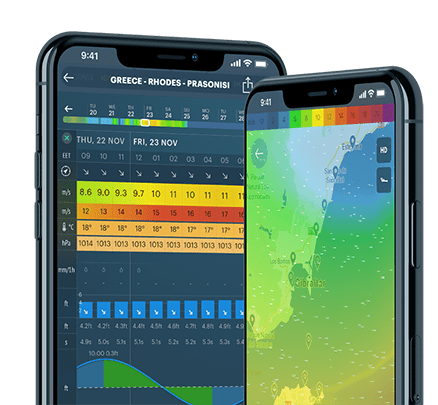
Why is it so cold this winter. In pursuit of new record (low) temperatures
Many countries in the northern hemisphere have experienced abnormally cold temperatures, snowfalls, and blizzards this 2022–23 winter. There were transport collapses, communal service failures, and even human casualties. What is going on with the weather? Why does everyone say the climate is getting warmer when there is record-breaking frost outside? In this lesson of the Windy.app Meteorological Textbook (WMT) and newsletter for better weather forecasting we'll figure out why is it so cold in the world this winter.
Where was it cold, exactly?
At different times, almost everywhere. This year, on Christmas Day in many areas of the U.S., from the Great Lakes to Florida, recorded record-breaking frost and snowfall. Combined with high winds, the weather became very dangerous, and you could get hypothermia in just a few minutes.
In Eastern Europe, abnormally cold temperatures of as low as –20°C were observed at the end of November. In January, in Mohe, China, the national minimum temperature record for the entire history of observation was beaten: –53 °С. In Siberia, at the beginning of January, the cold snap was also close to a record: at several weather stations the temperature dropped below -60°C, and many people saw a freezingly (quite literally) scary –70 °C on their personal thermometers. Record cold temperatures were also recordeded in Kazakhstan.
What caused the cold weather?
Winter frost is almost always caused by anticyclones — atmospheric vortices with high pressure in the center, which are formed because of the strong cooling of the earth. And an anticyclone that has already developed leads to cloudless weather, accelerating the cooling of the earth's surface and increasing the coldness.
Therefore, the popular opinion that a "bomb" (i.e., a rapidly developing) cyclone was to blame for the abnormally cold weather in the U.S. is not quite correct. No less important was a very powerful anticyclone, which had been over Canada and Alaska since the middle of the month. Toward Christmas, it moved far south, taking the cold polar air with it.

Why was it so cold in the USA. Valerya Milovanova / Windy.app
In Europe and Asia, the cold is also associated with anticyclones. For example , in January, Western Russia and Kazakhstan were swept by an anticyclone from the North Pole. But the most potent northern hemisphere anticyclone normally forms in Asia, over Mongolia. Usually in November and December it "gathers strength" and only in January does it begin to move over the mainland. But this winter, it intensified unusually early, while being very mobile and influencing different parts of the continent.

Why was it so cold in Europe and Asia. Valerya Milovanova / Windy.app
Did anticyclones become so active because global warming ended?
No, climate change continues. But exactly what process leads to the unusual behavior of the anticyclones still remains unknown. Here are the most interesting hypotheses:
- Random course of events. The occurrence of cyclones and anticyclones is often seen as a random process. Not because we have no idea how they form, but because very weak, random fluctuations in temperature or pressure can lead, through a chain of connected events, to the formation of huge vortices affecting entire continents.
- Relationship to the upper atmosphere. The upper atmosphere plays a very important, but poorly understood, role in weather. For example, a circumpolar vortex is a huge cyclone that appears in the stratosphere (at a height of about 30 km) every winter. It can grow bigger or smaller, stronger or weaker. All this affects the cyclones and anticyclones below, which are responsible for the weather. But we still know very little about this connection.
- Unexpected effects of global warming. Yes, even this is not so simple. Because of global climate change, cyclones from the Atlantic and Pacific oceans are shifting closer to the north pole. And cyclones are the main source of warm air in winter. Therefore, in temperate latitudes, where they used to bring a lot of heat, it may get colder now.
Climate change is also melting the glaciers in Greenland. Cold meltwater flows into the Atlantic Ocean, lowering its temperature. This could weaken the Gulf Stream, which brings heat to the temperate zone of the northern hemisphere. And it will get colder in the Atlantic, while in most other areas, the climate will be getting warmer. By the way, the disaster movie "The Day After Tomorrow" is based on this theory! Although, as expected, much of what happens in the movie is completely anti-science.
Should we expect more weather records?
Absolutely. The longer we observe the weather, the more unique events we get a chance to witness. For example, cold weather, which comes once in 10, 50, or 100 years. And because of climate change, the weather becomes more "nervous", and the number of abnormal events greatly increases. This applies not only to temperature but also to precipitation, wind, and all other weather components, including dangerous phenomena. So weather records will always be a part of our lives.
Text: Eugenio Monti, a meteorologist and a climatologist
Cover photo: Fabrizio Conti / Unsplash
You will also find useful
What is the difference between weather and climate
What causes heat waves in the summer
What is extreme weather and how it relates to climate change
Latest News
Professional Weather App
Get a detailed online 10 day weather forecast, live worldwide wind map and local weather reports from the most accurate weather models.
Compare spot conditions, ask locals in the app chat, discover meteo lessons, and share your experience in our Windy.app Community.
Be sure with Windy.app.



